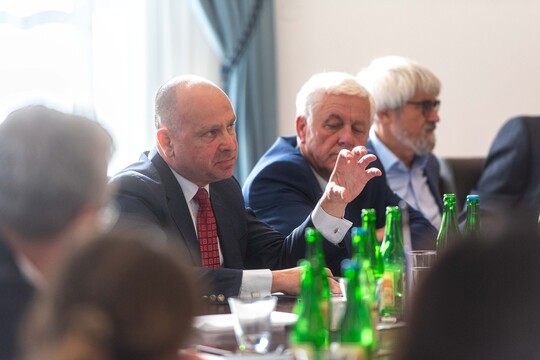Today marks the conclusion of Jaromír Jirsa's ten-year term of office. Some judges undergo a personal transformation during their service as Justices of the Constitutional Court; others, by contrast, transform the environment around them. Jaromír Jirsa was undoubtedly the latter.
If I had to sum up his personality in a single word, I would simply choose “judge”. I have never met anyone who embodied this profession more completely in their conduct, reasoning and demeanour. Jaromír Jirsa has served as a judge for 33 uninterrupted years. He began his career at the District Court for Prague 8, later became Vice-President of the District Court for Prague 1, and from 2007 served at the Prague Municipal Court, where he went on to once again hold the position of Vice-President. For eight years he was also President of the Czech Union of Judges and became one of the most respected experts in the field of civil procedure.
His appointment to the Constitutional Court in 2015 therefore came as no surprise. Unlike academics who had to familiarise themselves with the intricate mechanisms of judicial proceedings, Justice Jirsa was in his element from day one. He approached each new case with energy, making notes as he read through it, calling his assistants with instructions on what to prepare, send or research. Thanks to this approach, he decided cases swiftly and did not keep the parties concerned in unnecessary suspense – constitutional complaints assigned to him were resolved on average within 69 days, while the overall average was 50 days longer. What is more, he completed all his assigned cases before the end of his mandate, leaving his successor a clean slate.
During his time in office he acted as Justice Rapporteur in 2,951 proceedings, 141 of which resulted in judgments. Some of his plenary judgments are well known to the wider public, whether on the taxation of church restitutions (Pl. ÚS 5/19), the collection of telecommunications data (Pl. ÚS 45/17), or surgical intervention as a condition for legal gender recognition (Pl. ÚS 52/23); and there are two dozen more plenary judgments to his name, no less significant.
Amid these “major” rulings of the Plenum, it should not be overlooked that Jaromír Jirsa also played a crucial role in shaping the case law of the Constitutional Court in family matters. His decisions always made clear that he regarded children as the focal point of such disputes, whose best interests must be protected above all else – despite quarrelling parents and despite the mechanical approach sometimes taken by other courts. This is captured beautifully in a sentence from one of his final judgments (II. ÚS 1504/25): “Children are burdened not only by the unreasonable and often selfish conduct of their parents during custody proceedings, but also by the state, which in turn is often unable to guarantee the child's right to prompt and effective proceedings – and let it be emphasised again – in which the principal party is the child (not the parents).”
Jaromír Jirsa was – and remains – a strict judge, who placed the highest demands both on himself and on his colleagues. He had no patience for excuses, laziness or empty theoretical debates, but he always responded readily and swiftly to anyone seeking his help or advice. His insistence on rationality and efficiency in decision-making became a valuable life lesson for all of us who had the honour of working alongside him. And, importantly, he leaves no unfinished cases behind.
Jaromír Jirsa would often begin his remarks at meetings of the Plenum with the words: “I will be brief…”. Let me try the same: Thank you for ten years in the service of protecting constitutionalism. We will miss your directness (and your English humour).
Vlastimil Göttinger
Secretary General
